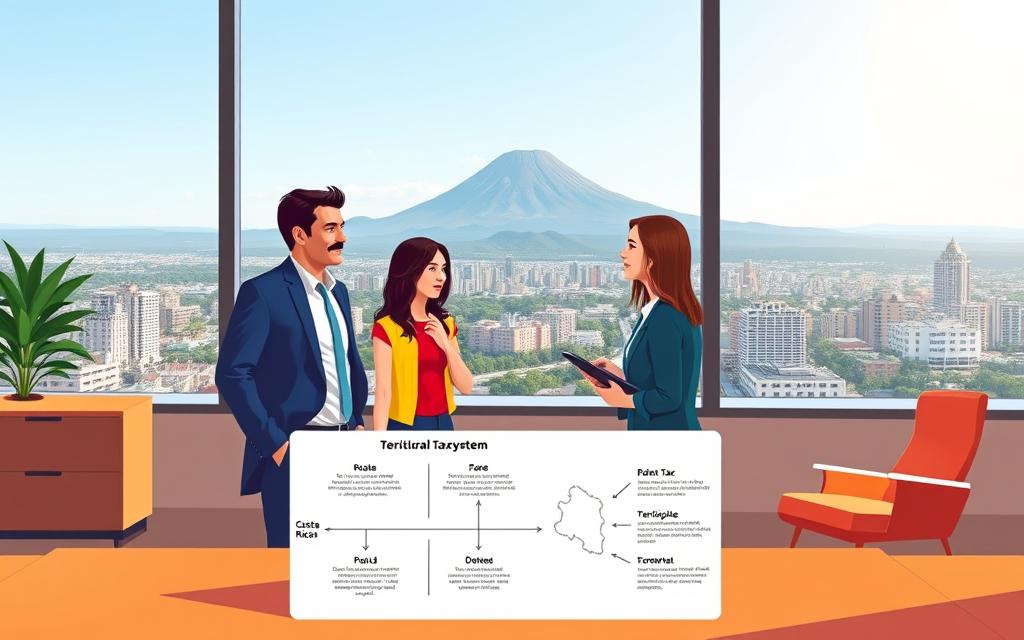Tax Obligations for Digital Nomads in Costa Rica Explained

Costa Rica has emerged as a haven for digital nomads seeking a better quality of life and a favorable tax environment. With its stunning natural beauty, mild climate, and rich culture, this Central American country has become a top destination for remote workers and entrepreneurs.
We will explore how Costa Rica's territorial tax system benefits digital nomads earning income from abroad. The country's tax system only taxes income generated within Costa Rica, making it an attractive option for those with foreign income sources. For more information on the requirements for Costa Rica's digital nomad visa, visit this resource.
Understanding tax obligations is crucial for digital nomads to optimize their tax situation while enjoying Costa Rica's natural beauty and growing digital infrastructure.
Understanding Costa Rica's Territorial Tax System

Understanding the territorial tax system is essential for digital nomads who wish to leverage Costa Rica's tax advantages. Costa Rica's tax system is considered territorial, meaning it only taxes income that is sourced within the country.
How the Territorial Principle Works
The territorial principle works by distinguishing between income earned within Costa Rica and income earned from foreign sources. For digital nomads, this means that income earned from foreign clients or companies is not subject to Costa Rican taxation, provided it is not remitted or earned within Costa Rica.
For instance, if you are a digital nomad working for a foreign company, your salary is not taxable in Costa Rica if it's not sourced from within the country. This principle can significantly simplify tax obligations for digital nomads.
Taxation of Foreign vs. Local Income
Costa Rica treats foreign-earned income differently than locally generated income for tax purposes. While foreign income is generally not taxable, locally sourced income is subject to taxation. For digital nomads, understanding this distinction is crucial as it forms the basis of the tax advantages offered by Costa Rica.
To comply with Costa Rican tax laws, it's essential to understand how the tax authorities determine the source of income. For more detailed information on tax obligations, you can visit this resource.
The Digital Nomad Visa Program in Costa Rica
Costa Rica has introduced a specialized visa program catering to the needs of digital nomads and remote workers. This program is designed to attract global talent, offering a unique blend of work and leisure in a tropical setting.

2025 Eligibility Requirements and Income Thresholds
To be eligible for Costa Rica's digital nomad visa in 2025, applicants must meet specific requirements, including demonstrating a minimum income from a reliable source. The income threshold is set to ensure that digital nomads can support themselves during their stay. For the most current information, it's advisable to check the official Costa Rican Immigration website or consult with a legal expert specializing in visa applications.
Key requirements include compiling 12 months of bank statements, obtaining a criminal background check, and purchasing health insurance that meets the minimum coverage requirements set by Costa Rican authorities.
Application Process, Timeline, and Costs
The application process for the digital nomad visa has been streamlined in 2025, but it still requires careful preparation. Applicants need to gather financial documentation, obtain a criminal background check, get documents apostilled, purchase qualifying health insurance, prepare passport photos, and complete the application form available on the Costa Rican Immigration website. The entire process typically takes 2-3 months from start to finish.
Understanding the associated costs, including government fees, document authentication, and optional legal assistance, is crucial for budgeting purposes. For a detailed breakdown of these costs and the application timeline, visiting the official immigration website or consulting with a visa expert is recommended.
Tax Obligations for Digital Nomads in Costa Rica

With its unique territorial tax system, Costa Rica offers digital nomads a tax-efficient environment that warrants exploration. As a digital nomad considering Costa Rica as your temporary home, understanding the local tax obligations becomes crucial for maximizing the benefits of your stay.
Zero Taxation on Foreign-Earned Income
Costa Rica's territorial tax system means that digital nomads are exempt from paying taxes on foreign-earned income. This exemption applies as long as the income is sourced outside of Costa Rica, making it an attractive destination for remote workers. The regulation allows beneficiaries to stay as international workers or service providers without performing paid work in the national territory.
When You Might Still Owe Taxes in Costa Rica
While foreign-earned income is not taxed, there are scenarios where digital nomads might still incur tax obligations in Costa Rica. For instance, providing services to Costa Rican clients or businesses can trigger local tax obligations. Additionally, establishing a local business entity or earning income from Costa Rican sources, such as rental property, can lead to tax liabilities. It's essential to understand these scenarios to avoid unintended tax consequences.
Digital nomads must be cautious not to engage in unauthorized local work, as this can result in penalties and interest. Understanding the tax implications of different activities and income sources is crucial for maintaining compliance with Costa Rican tax laws.
Banking and Financial Management for Digital Nomads

As digital nomads settle in Costa Rica, managing their finances effectively becomes a top priority. Setting up a local bank account can significantly simplify financial tasks, saving an average of $300 annually in transaction fees, as noted by James Rodriguez, a financial advisor specializing in expat banking.
Opening Local Bank Accounts with Your DIMEX Card
With a DIMEX card, digital nomads can open local bank accounts, making it easier to handle rent payments and utility bills. For stays longer than three months, working with a local real estate agent can help negotiate better lease terms.
Managing International Income and Currency Exchange
Digital nomads must efficiently manage international income and currency exchange. Options like Wise, Revolut, and OFX offer competitive rates compared to traditional bank transfers. Maintaining proper financial records, including organized bank statements, is crucial for tax compliance and future visa renewals. For more information on obtaining a digital nomad visa, visit this resource.
By balancing local and international accounts, digital nomads can ensure they have sufficient funds for expenses in Costa Rica while maintaining minimum balances in their home country's accounts.
Comparing Residency Options and Their Tax Implications

Costa Rica offers various residency options, each with distinct tax implications that digital nomads should carefully consider. As we explore the different paths to residency, it's essential to understand how each option affects your tax obligations and long-term financial planning.
Digital Nomad Visa vs. Temporary Residency Options
The Digital Nomad Visa is an attractive option for remote workers, offering a straightforward path to living in Costa Rica. However, it's crucial to compare this visa with other temporary residency options, such as rentista or pensionado visas, which may offer different benefits and tax implications. For instance, the Digital Nomad Visa allows foreigners to work from Costa Rica without being subject to local income tax on foreign-earned income.
Temporary residency options, including the Digital Nomad Visa, typically require renewal after a certain period, usually every year or two years. Understanding the renewal process and the requirements for maintaining your residency status is vital for long-term planning.
Path to Permanent Residency and Long-Term Tax Planning
For those considering making Costa Rica their long-term home, understanding the path to permanent residency is essential. After holding a temporary residency permit for three years, individuals can apply for permanent residency, which offers greater flexibility and work permit benefits. Permanent residents can work without restrictions and enjoy more flexibility in terms of residency requirements.
From a tax perspective, permanent residency continues to benefit from Costa Rica's territorial tax system, meaning foreign-earned income remains exempt from local taxation. However, it's crucial to consider long-term tax planning strategies, including retirement and investment planning, to maximize the benefits of residency in Costa Rica.
Maintaining Tax Compliance in Your Home Country

Living and working in Costa Rica doesn't exempt digital nomads from tax responsibilities in their country of origin. As digital nomads spend time in Costa Rica, they must remain aware of their tax obligations in their home country to avoid potential issues.
Understanding Double Taxation Agreements
Double taxation agreements (DTAs) are crucial for digital nomads to understand, as they prevent being taxed twice on the same income. Costa Rica has DTAs with several countries, which can significantly impact a digital nomad's tax liability. For instance, if there's a DTA between Costa Rica and your home country, you might not be taxed on the same income in both countries. It's essential to review the specific DTA between Costa Rica and your home country to understand how it applies to your situation.
Foreign Income Reporting Requirements
Digital nomads must typically fulfill foreign income reporting requirements in their home countries, even while living tax-free in Costa Rica. For example, U.S. citizens might need to file the Foreign Bank Account Report (FBAR) or comply with the Foreign Account Tax Compliance Act (FATCA). Understanding these requirements is vital to avoid penalties. Residency status in your home country might be affected by living in Costa Rica, often determined by the "183-day rule" or other physical presence tests. Maintaining proper documentation of your time in different countries is necessary for tax compliance.
Best Locations for Tax-Efficient Digital Nomad Living

For digital nomads, Costa Rica offers an attractive combination of lifestyle and tax benefits. The country has various locations that cater to different preferences, from urban centers to coastal areas.
San José and Central Valley for Business Infrastructure
San José and the Central Valley are ideal for digital nomads who require robust business infrastructure. These areas offer reliable internet, coworking spaces, and a range of amenities. The cost of living in San José is relatively lower compared to coastal towns, with a monthly budget of $1,500-$2,000 allowing for a comfortable lifestyle. Explore more about Costa Rica's best cities for digital.
Coastal Areas with Growing Digital Nomad Communities
Coastal areas like Tamarindo, Santa Teresa, and Puerto Viejo are popular among digital nomads seeking a beach lifestyle. These towns offer a range of accommodation options and a growing expat community. While internet speeds can be variable (20-80 Mbps), many nomads use cellular backup solutions like portable hotspots with 4G/5G service from providers like Kolbi or Movistar. The cost of living in these areas is generally higher, ranging from $1,600 to $2,500 per month.
Conclusion: Maximizing Costa Rica's Tax Benefits as a Digital Nomad
As we've explored throughout this article, Costa Rica presents a compelling opportunity for digital nomads seeking a blend of tax benefits, natural beauty, and quality of life. The territorial tax system, which exempts foreign-earned income from taxation, provides a significant financial advantage for digital nomads who maintain their income sources outside Costa Rica.
To maximize these benefits, it's crucial to maintain a clear separation between foreign and local income sources and ensure compliance with both Costa Rican regulations and home country tax requirements. For those considering a longer stay, pathways from the digital nomad visa to other residency options are available, each with its own tax implications and benefits. Digital nomads can also explore options for health insurance in Costa Rica, ensuring comprehensive coverage during their stay.
For personalized assistance with your move to Costa Rica, contact Jaros CR at www.jaroscr.com, info@jaroscr.com, or +(506)7182-8969. With proper planning and compliance, digital nomads can enjoy the advantages of Costa Rica's tax environment while maintaining their global lifestyle.


